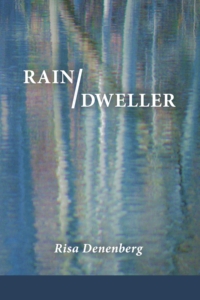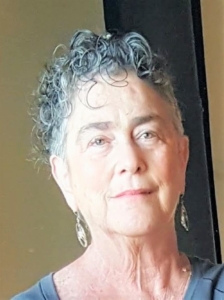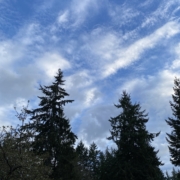Risa Denenberg: RAIN/DWELLER
 RAIN/DWELLER, Risa Denenberg. MoonPath Press, P.O. Box 445, Tillamook, OR 27142, 2013, 96 pages, $16.99, paper, http://MoonPathPress.com.
RAIN/DWELLER, Risa Denenberg. MoonPath Press, P.O. Box 445, Tillamook, OR 27142, 2013, 96 pages, $16.99, paper, http://MoonPathPress.com.
Yes, it IS National Poetry Month. Instead of my usual every-day-in-April poetry-binge, I am committed to reading a book of poems each week this year, and posting a review here. So far I think I’m 13/14, but this week I’m determined to catch up.
For the last couple of days I have been reading Risa Denenberg’s Rain/Dweller. The poems are, as Rena Priest says in her cover blurb, “honest and unflinching.” They are also, Priest continues, “temper[ed] with tenderness, vulnerability, beauty, and delight.” Indeed. David Guterson says of reading these poems: “Part of the loveliness for me was the expectation of arriving at yet another arresting line—of being brought to a halt by something piercingly true.” These 71 poems remind us that if difficult truths are … well, difficult … there is something beautiful about looking closely, unflinchingly, at them.
Rain/Dweller embraces loss; AIDS and Covid play important roles here, as does aging, parenthood, and climate change. “I dreamt you went missing, left without luggage” one poem begins (“Selfie with Baggage”); another, “Start with the cracked teapot” (“Intestate”). A family nurse practitioner, Denenberg writes in “The Fragrance of Crushed Fruit”: “O death: you are not a river, but I have careened your banks / my whole career, studying your silences, / submitting to your elegies.” In “Remembering Rachel Carson”: “I can’t revive my dad or MLK, all my corpses, the / homeless sleeping in parks under statues, the ruined / earth, Rachel Carson’s eyes.” Were it not for the tenderness, the beauty and delight, it would be too much to take in.
As an example of the “unflinching honesty,” I want to share one poem from the sonnet sequence, “Post-Human.” This is a 19-poem chronicle where Denenberg calls things by their right names, and calls us to accountability:
We know we’re unprepared for what’s in store.
We won’t be going home again. What was home
anyway? Wonder Bread and Log Cabin syrup?
Pabst Blue Ribbon and Twinkies? Or was it where
we learned that the birthday balloons we released
did not go to heaven; they killed turtles. We buried
pets in the backyard and fled across continents.
Too late I saw it was I who colonized, sanctioned
slavery, flattened Hiroshima. Our bodies contain
sewage, double lattes, oncogenes. We angst about
the planet and fill our homes with shit. We plug
the ocean with plastic and expect lunch at noon,
milk and crackers at bedtime. Truth time:
we’ve committed the unforgivable and buried it.
—Risa Denenberg, from “Post-Human” (p. 31)
In the first poem, “Old Trees, Old Lovers: A Postscript,” Denenberg writes, “I love what is gnarly, what is braided— /  banyans and mangroves, the hued peeling bark of madronas— / in the same way I love my worn, battered boots. / I know my position. I’ve unwound my watch.”
banyans and mangroves, the hued peeling bark of madronas— / in the same way I love my worn, battered boots. / I know my position. I’ve unwound my watch.”
Owning and owning up to what is gnarly, braided, battered, unwound strikes me as a good place to start if we want to effect real change in the world.
Denenberg has written eight collections of poetry. To read more about her, begin with her website (and read one of my favorite poems in the book, “Enough Beauty in This World”) at https://risadenenberg.com.

